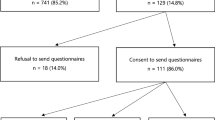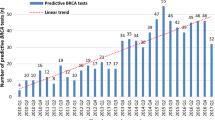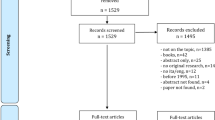Abstract
Differences in reported uptake of genetic testing for mutations in BRCA1 and BRCA2 can largely be accounted for by different methodologies and by studying research vs nonresearch families. In our joint study of 75 nonresearch families from two UK centres in which at least 3 years had elapsed since the initial proband had been informed of the availability of testing, only 45 and 34% of eligible individuals from Manchester and London, respectively, had come forward for counselling. Final uptake rates using a non-proactive approach were 53 and 29% for women and 11–12% for men, but the figure among those attending clinic was 73 and 62%, respectively. Unlike previous studies, we did not find that uptake had stabilised after a year with 25% of those being tested more than 2 years after the family was informed, and several delaying a considerable time between genetics appointments. We believe that the particularly low uptake even of counselling in men may need to be addressed by improving family communication or providing information sheets for family members to disseminate.
Similar content being viewed by others
Log in or create a free account to read this content
Gain free access to this article, as well as selected content from this journal and more on nature.com
or
References
Watson M, Murday V, Lloyd S, Ponder B, Averill D, Eeles R : Genetic testing in breast/ovarian cancer (BRCA1) families. Lancet 1995; 346: 583.
Lerman C, Narod S, Schulman K et al: BRCA1 testing in families with hereditary breast–ovarian cancer. A Prospective Study of Patient Decision Making and Outcomes. JAMA 1996; 275: 1885–1892.
Croyle RT, Smith KR, Botkin JR, Baty B, Nash J : Psychological responses to BRCA1 mutation testing: preliminary findings. Health Psychol 1997; 16: 63–72.
Binchy A, Evans DGR, Eng C, Ponder BAJ, Craufurd D : Factors influencing decisions on whether to proceed with predictive testing for breast/ovarian cancers. J Med Genet 1995; 32: 140.
Wooster R, Bignell G, Lancaster J et al: Identification of the breast cancer susceptibility gene BRCA2. Nature 1995; 378: 789–792.
Schoenfeld M, Myers RH, Berkham B, Clark E : Potential impact of a predictive test on the gene frequency of Huntington disease. Am J Med Genet 1984; 18: 423–429.
Craufurd D, Dodge A, Kerzin-Storrar L, Harris R : Uptake of pre-symptomatic predictive testing for Huntington's disease. Lancet 1989; II: 603–605.
Tibben A, Niermeijer MF, Roos RAC et al: Understanding the low uptake of presymptomatic DNA testing for Huntington's disease. Lancet 1992; 340: 1416.
Harper PS, Lim C, Craufurd D : Ten years of pre-symptomatic testing for Huntington's disease: the experience of the UK Huntington's disease prediction consortium. J Med Genet 2000; 37: 567–571.
Atkan-Collan K, Mecklin J-P, Jarvinen H et al: Predictive genetic testing for hereditary non-polyposis colorectal cancer: uptake and long-term satisfaction. Int J Cancer (Pred Oncol) 2000; 89: 44–50.
Lerman C, Hughes C, Trock BJ et al: Genetic testing in families with hereditary nonpolyposis colon cancer. JAMA 1999; 281: 1618–1622.
Evans DGR, Maher ER, Macleod R, Davies DR, Craufurd D : Uptake of genetic testing for cancer predisposition. J Med Genet 1997; 34: 746–748.
Lerman C, Daly M, Masny A, Balsham A : Attitudes about genetic testing for breast–ovarian cancer susceptibility. J Clin Oncol 1994; 12: 843–850.
Struewing JP, Lerman C, Kase RG, Glambarrest TB, Tucker MA : Anticipated uptake and impact of genetic testing in hereditary breast and ovarian cancer families. Cancer Epidemiol Biomarkers Prev 1995; 4: 169–173.
Julian-Reynier C, Eisinger F, Vennin P et al: Attitudes towards cancer predictive testing and transmission of information to the family. J Med Genet 1996; 33: 731–736.
Lerman C, Seay J, Balshem A, Audrain J : Interest in genetic testing among first-degree relatives of breast cancer patients. Am J Med Genet 1995; 57: 385–392.
Julian-Reynier C, Sobol H, Sévilla C, Noguès C, Bourret P The French Cancer Genetic Network: Uptake of hereditary breast ovarian cancer genetic testing in a French national sample of BRCA1 families. Psycho-Oncology 2000; 9: 504–510.
Botkin JR, Smith KR, Croyle RT et al: Genetic testing for a BRCA1 mutation: prophylactic surgery and screening behavior in women 2 years post testing. Am J Med Genet 2003; 118A: 201–209.
Hagoel L, Dishon S, Almog R, Silman Z, Bisland-Becktell S, Rennert G : Proband family uptake of familial genetic counselling. Psycho-Oncology 2000; 9: 522–527.
Bowles Biesecker B, Ishibe N, Hadley DW et al: Psychosocial factors predicting BRCA1/BRCA2 testing decisions in members of hereditary breast and ovarian families. Am J Med Genet 2000; 93: 257–263.
Smith KR, West JA, Croyle RT, Botkin JR : Familial context of genetic testing for cancer susceptibility: moderating effect of siblings' test results on psychological distress one to two weeks after BRCA1 mutation testing. Cancer Epidemiol Biomarkers Prev 1999; 8: 385–392.
Reichelt JG, Dahl AA, Heimdal K, Moller P : Uptake of genetic testing and pre-test levels of mental distress in Norwegian families with known BRCA1 mutations. Disease Markers 1999; 15: 139–143.
Meijers-Heijboer EJ, Verhoog LC, Brekelmans CTM et al: Presymptomatic DNA testing and prophylactic surgery in families with a BRCA1 or BRCA2 mutation. Lancet 2000; 355: 2015–2020.
Armstrong K, Weiner J, Weber B, Asch DA : Early adoption of BRCA1/2 testing: who and why. Genet Med 2003; 5: 92–98.
Author information
Authors and Affiliations
Corresponding author
Rights and permissions
About this article
Cite this article
Brooks, L., Lennard, F., Shenton, A. et al. BRCA1/2 predictive testing: a study of uptake in two centres. Eur J Hum Genet 12, 654–662 (2004). https://doi.org/10.1038/sj.ejhg.5201206
Received:
Revised:
Accepted:
Published:
Issue date:
DOI: https://doi.org/10.1038/sj.ejhg.5201206
Keywords
This article is cited by
-
Uptake of BRCA1/BRCA2 predictive genetic testing in an Irish population is low: a missed opportunity
Irish Journal of Medical Science (1971 -) (2023)
-
The uptake of predictive DNA testing in 40 families with a pathogenic BRCA1/BRCA2 variant. An evaluation of the proband-mediated procedure
European Journal of Human Genetics (2020)
-
Peridiagnostic and cascade cancer genetic testing
Nature Reviews Clinical Oncology (2020)
-
Pediatric reporting of genomic results study (PROGRESS): a mixed-methods, longitudinal, observational cohort study protocol to explore disclosure of actionable adult- and pediatric-onset genomic variants to minors and their parents
BMC Pediatrics (2020)
-
Impact of free cancer predisposition cascade genetic testing on uptake in Singapore
npj Genomic Medicine (2019)



